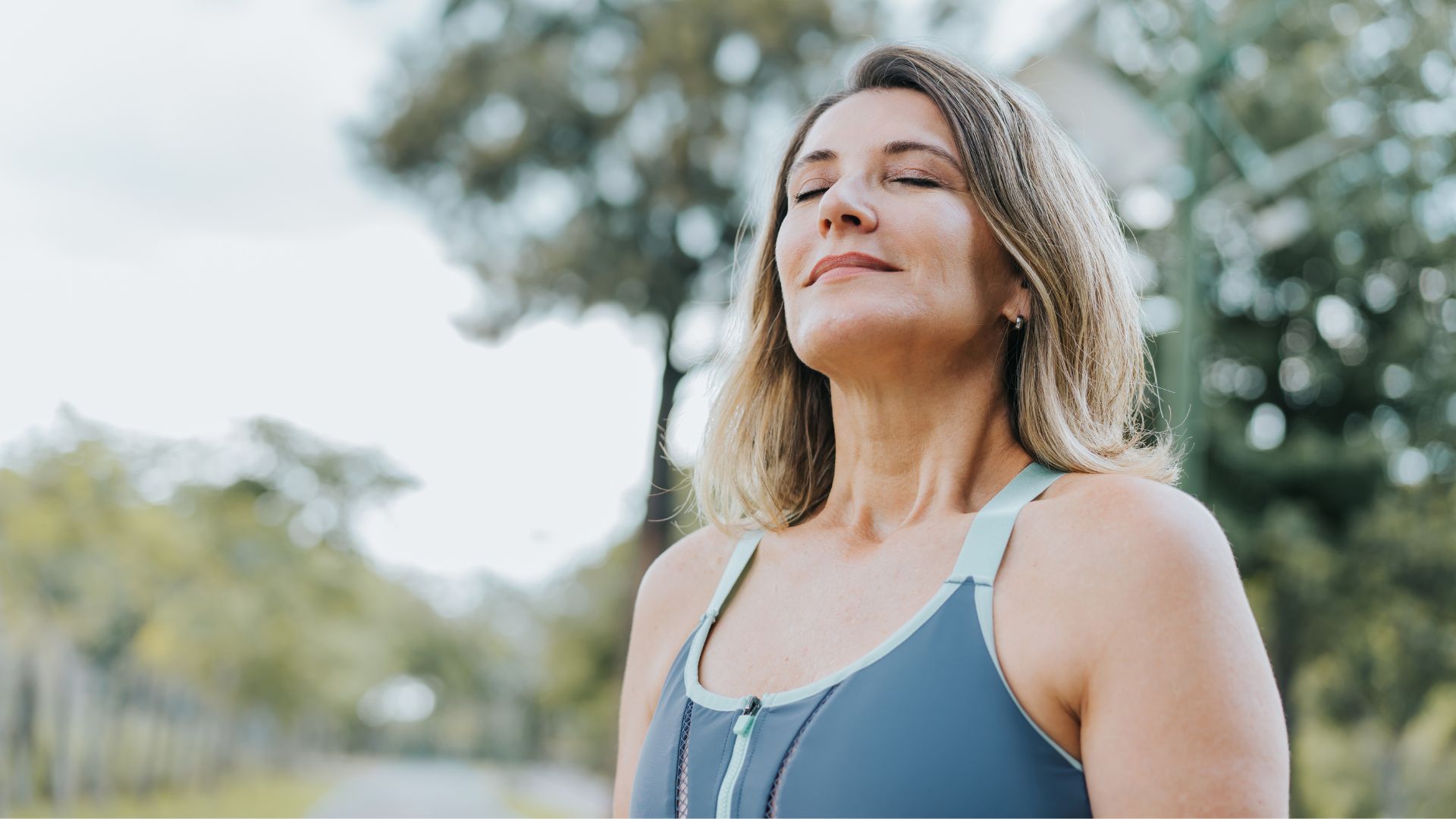
While we talk as if menopause lasts years, it's actually only a moment in time: 12 months after your final period. In the years before, we're actually going through perimenopause, characterised by irregular periods and classic symptoms like hot flushes, sleep disturbances, and mood swings.
Menopause signals the end of perimenopause and the start of postmenopause, when symptoms begin to ease. However, you may still need the medications (i.e. HRT) and lifestyle changes you took up to deal with the perimenopause symptoms.
To help us understand this life stage a little better, I've spoken to leading voices in menopause care about the symptoms to look out for, how to work out which stage of menopause you're in, and the help available.
What is menopause?
Menopause occurs when a woman hasn't had a period for a year, says Dr Louise Newson. "It's caused by the ovaries no longer functioning properly, which leads to a decline in hormone levels," she says.
A blood test also isn't needed to confirm that you've been through menopause, says Dr Aarthi Sinah, a GP and an ambassador for menopause platform Issviva. "At this stage, the ovaries no longer release eggs and oestrogen levels remain low. There may be less intense symptoms of the perimenopause (such as hot flushes and mood swings), and other symptoms may become more prominent, such as vaginal dryness, urinary symptoms and general aches and pains."
In the UK, the average age for menopause is between 51, according to the NHS, but everyone is different, and it depends on factors like genetics and other medical conditions. For example, many women of South Asian and Afro-Caribbean descent tend to go through menopause earlier.
What are the symptoms of menopause?
In perimenopause, you may have irregular or heavy periods, but when you've been through menopause, your period stops completely. If you have any bleeding or spotting after menopause, it's vital to see a doctor.
Otherwise, you'll notice that the symptoms of perimenopause and menopause are very similar.
- No periods: You'll know you're officially menopausal when you haven't had a period for 12 months.
- Vaginal dryness: According to a study by the University of California Davis, around 19% of women experience the symptom in the first few years of perimenopause, increasing to 34% of women aged between 57 and 69 years old. It's uncomfortable and can cause issues when having sex in menopause.
- Aches and pains: Aching joints are caused by a drop in oestrogen, which would otherwise protect the joints from inflammation. We also lose bone density with declining hormones, which can lead to conditions like osteoporosis without intervention.
- Low mood: “Psychological symptoms such as low mood, reduced energy, intrusive thoughts, feelings of reduced self-worth and low self-esteem, loss of confidence, and irritability can take place during menopause,” says Dr Newson. “Some women even have suicidal thoughts during this time.
- Hot flushes: "If you are experiencing random feelings of intense heat that come on suddenly, spread throughout your body and face, and leave you feeling overheated, sweaty, and flushed, where your skin takes on a red hue, you could be having hot flushes," says Dr Kate Burns, a GP with a special interest in menopause at Health & Her. However, for many women, these become less frequent after perimenopause.
- Gut changes: “Hormone changes during menopause have been linked to a range of digestive issues such as nausea, diarrhoea, and cramping, alongside bloating,” says Dr Burns.
- Brain fog: “Women may struggle to remember why they came into a room, forget about routine tasks and simple activities, find it difficult to find the correct words, remember people’s names, and just generally feel a bit mentally out of kilter. It may also be difficult to concentrate or focus on a task at hand," says Dr Burns.
- Weight changes: It's very normal to notice changes in your weight and to see more weight around your middle (known as the 'menopause tummy') as declining hormone levels shift fat to this area.
- Sleep disturbances: “Hot flushes can also occur at night, so some women experience night sweats as a result,” says Miss Tania Adib, consultant gynaecologist at The Lister Hospital, part of HCA Healthcare UK. “Alongside this, women report experiencing insomnia or changes to their sleep pattern.”

What is early menopause?
Early menopause often occurs in women under the age of 45. It’s unusual, but it can happen, as Dr Newson explains. “Early menopause is known as premature ovarian insufficiency, and it occurs in women under the age of 40,” she says. “It’s very common and can affect around one in a hundred women under the age of 40 and one in a thousand women under the age of 30."
Dr Newson explains, "Sometimes early menopause can occur without any unknown triggers, whereas for some women it is because their ovaries are removed due to an operation or they are damaged by medication or radiotherapy, for example. Women of any age can become menopausal, even as young as a teenager.”
Early menopause must be diagnosed and treated, as those who go through menopause early are susceptible to greater health risks than older menopausal women.
What can help with symptoms menopause?
Hormone replacement therapy (HRT) is the most effective option for treating many symptoms of menopause, and most women can safely take it under their doctor's care. It can be hugely beneficial for those with hot flushes, night sweats, mood swings, and vaginal dryness, which can lead to issues like pain during sex.
You can get HRT in many forms, including creams, gels, or sprays. For those dealing with vaginal dryness, topical forms applied directly in the vagina via creams, pessaries, or rings can be useful.
However, not everyone can have this treatment, or wants to. Luckily, there are plenty of alternatives to HRT. These include different medications that target certain areas of the body to deal with particular symptoms (for example, antidepressants may be prescribed for those with low mood, anhedonia, or anxiety in menopause) and lifestyle changes.
Speak to your doctor if you're seeking help for menopause symptoms, as they will be able to advise the best course of action for you.
What are the stages of menopause?
We often refer to the time when we first see symptoms of menopause through to postmenopause as 'menopause', but there are actually three distinct stages. Here's how to tell them apart:
Perimenopause is the start of and the transition phase from being premenopausal (when most women have a period) to postmenopausal. "Women’s oestrogen and progesterone levels fluctuate significantly with a gradual decline, which can cause a variety of symptoms including hot flushes, mood changes, insomnia and irregular periods. This phase can sometimes last several years," says Dr Sinah.
Menopause is the day that marks one year since the last period. "When a woman has had no periods for 12 consecutive months, they are in menopause. It marks the natural end of fertility and periods, and this comes after the perimenopausal phase," she says.
Postmenopause is the time immediately after this. It's negatively characterised by increases in certain health conditions like heart disease and osteoporosis, but it can also be a hugely positive time for many women.
Tips to deal with menopause symptoms
- Manage your stress: It's easy to say 'reduce stress' to help manage menopause symptoms, but lowering your cortisol levels will have a seriously positive impact, the doctors say.
- Stay active: Stick with your favourite activity but "mix some resistance training with cardio work to maintain bone density and heart health", suggests Dr Sinah.
- Improve your sleep: Many people find "mindfulness and relaxation techniques such as yoga" useful for this, says Dr Sinah.
- Take a look at your diet: "Try to incorporate natural sources of oestrogen such as soya and plant compounds (always check with your doctor first), reduce alcohol, stop smoking and have lots of protein," she says.
- Speak to your GP: Your doctor will be the best person to advise on all treatment options, including medications, HRT, and any additional supplements you should add to your diet.







